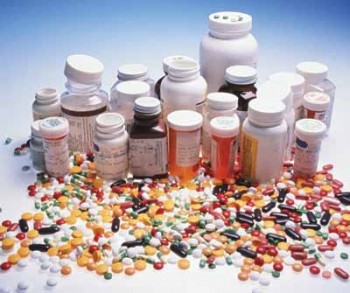Spurred by the Affordable Care Act, hospitals have turned their focus to reducing hospital readmission rates. Medicare will no longer reimburse hospitals if a patient is readmitted to the hospital within a month of their discharge. To prevent these readmissions, hospitals take great interest in the transitions of care - admission, transfers, and discharges - for at-risk patients. High-risk patients are determined by
 |
This patient is high-risk for readmission and
needs medication review and reconciliation. |
age, comorbidities, multiple medications, and economic status. Once a patient is identified, the Med Transition Specialists come into play to collect a complete and accurate Medication History. On this team, we spent three days during our rotation. Though all the IPPE's had different experiences, I enjoyed my time interacting with patients and feeling like I had an impact on their admission to the hospital.
Medication histories are generally taken by the nurses when a patient has been admitted. A lot of the time, the nurse can just copy and paste from their medical records. But time and again, this has shown to lead to inaccuracies and missed medications. Nurses have huge responsibilites in caring for the patient, the pharmacy department is best suited to taking care of a patient's medications. So at UNC and other hospitals, a team of pharmacy technicians review the collected histories which a pharmacist checks off for medication errors or duplications of therapy.
Unfortunately, the Med history team at UNC only consists of four technicians for the entire hospital. The means that they must focus on the high or moderate risk patients when collecting patient histories. The process was relatively simple.
- Print off the Medications Prior to Admissions from EPIC (computer system)
- Call the pharmacy if listed in their records to get their last refills (dates and quantities)
- Interview the patient to confirm which medications their are taking (and how)
- Make notes in EPIC regarding med use in records.
A person could probably get through 10 a day depending on the patients. Some interviews take longer when a patient talkative or lonely. Sometimes, their wrong pharmacy is listed or the person uses multiple pharmacies Some drug lists are longer - 15 or more medications. Over my days, we found a patient taking two medicines for the same condition, not taking enough (to make the expensive medicine last longer), taking too much (if some is good), or not taking their medicines at all (unpleasant side effects).
In the end, I found the people interesting and enjoyed working on real patients. Med Histories are important to provide the doctor with a full background of the patient before coming into the hospital. Later during the month, I wound up on pediatric rounds for patients if cystic fibrosis. The medical team had a long debate about what the kid was taking at home and how much we should give them while in the hospital. Since Med Transitions only have 4 technicians, they can't get everywhere. Perhaps the automation of the pharmacies will open up technicians to move to roles of taking med histories through out the hospital. I know that the focus is on high-risk medicare patients, but all patients are at some risk when they transition from one place to another. And pharmacists are the best suited members of the medical team to oversee those transitions.




